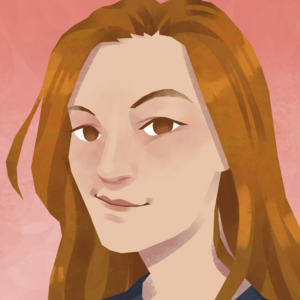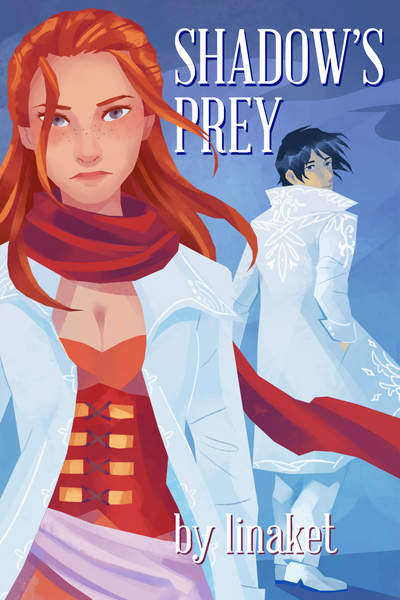1022 LC, Lugos
Irkalla sunk beneath the pristine halls of the Palamidia’s Tower like an oil slick. While there was structure and reason to the twists above, a maze of dead-ends and false exits lurked below. In the depths of it, Haru counted his breaths.
Absent all light, he concentrated on his body’s movements as he shifted through practiced stances. Time had stopped here, and he wasn’t sure if it was days or weeks since he had been imprisoned, but it didn’t matter. He knew patience, and he knew the dark. He knew the weight of it, where the edges were, and he knew just how far he could go.
Outside, the guards were settling into a routine. Reading intent wasn’t something that came to him naturally, but he had trained as the hand of the master. He knew enough to feel when the wariness of the guards faded and was replaced with fatigue and boredom.
The layers of Irkalla were built to contain the different loa abilities, and with each descending level the loas’ abilities weakened. Whatever cataclysmic event that caused or was caused by the death of the gods so many eons ago affected more than just the surface. The void of Ilazki sunk through the ground, muffling the loas’ connections.
Haru finished his stance with his fingers brushing against the rough wall. He shifted in the black and pressed his back against the stone, his skin scraping as he slid down against it.
Beneath the door, there was a light. He shut his eyes, concentrating on the pain in his skin to focus. All he had left was his mind. They wouldn’t take that.
The sound of voices in the hall was unfamiliar and jarring after so much silence.
“Please, Exalted One, it is dangerous. At least leave the light.”
“Then how would I see, child?” a woman asked, her voice laced with command.
Haru could hear the guards’ boots against stone as the shifted.
The woman sighed. “The others do not have the courage to face him. Since you know who I am, are you implying I am a coward?”
“No,” one of the guards said, “of course not, no.”
The voices moved closer until they were just outside his door. The glimmer of light beneath it peeled away the dark and Haru’s eyes squinted to adjust after so long in the dark. There was a fumbling of keys.
Haru relaxed his body and hunched against the stone. He turned to face the back wall and unfocused his eyes, playing the part of a broken man.
The door opened and the light entered, bleaching the interior of his stark prison. He could see the dirt streaked on his hands and forearms and the grime buried under his nails.
“Leave,” the woman said. Her tone was sharp and brooked no argument.
The door slammed and the locks clicked back in place.
Haru continued to stare at the wall as the guards retreated. His eyes adjusted to the pale lantern the woman had brought with her, and the light on his skin was clawing at him. It took most of his will not to yank the lamp from her and cradle it against himself.
“Well, this is a terrible spot we have found ourselves in, is it not?”
The woman moved closer to Haru, but there was no fear in her movement, nor was there anything careful about it. If anything, she was more relaxed than he feigned to be. He risked a glance at her, his eyes widening at the resemblance.
Haru shifted from his prone position and pulled his back straight. He pushed the hair from his eyes and rested his hands on his knees as he looked up at her.
She smiled as she set the lantern at his feet before settling across from him on the floor.
“That took longer than I thought it would,” she said. She adjusted the long robe she wore around her body, then interlaced her fingers in her lap. “You realize who I am, then?”
Her eyes were kohl-lined, so dark they were nearly black, and light wrinkles webbed their corners. An intricate braid of brown hair streaked with grey fell in a cascade over her shoulder.
Haru cleared his throat. “You’re the Exalted Mother,” he said, though his voice crackled with disuse.
“That is the title they have given me,” she said. She tilted her head, studying him. “You may call me by my name.”
Haru knew that movement.
He cleared his throat again, not wanting it to crack and betray him.
“She said your name was Aksana.”
Aksana smiled, then nodded. He wasn’t sure what else to say, or why she had come to him. She shifted to match his posture and he waited, not daring to hope.
“I am going to tell you a story,” she said. “I need you to remember it. Can you do that?”
Haru didn’t trust himself to speak so he nodded instead. Aksana reached forward, pushing the lantern closer to him with the tips of her fingers before leaning back once more.
“In the beforetimes, the world was whole and the gods were limitless.
“It was in this time that Adita ruled. She loved her people, dearly, and did everything to protect them. She blessed them with warmth when they were chilled, light when they were scared, stories when they had no hope.”
Aksana was a practiced storyteller. Her cadence was smooth, her voice low, and Haru hung on the story as she spoke.
“Forces began to conspire against Adita. Peace, you see, was as unsustainable then as it is now. Others feared her, the way she was able to make and unmake the reality of her people. The other gods seethed with jealousy, and, one day, they amassed at the borders of her land.
“She knew she had to face them, but she could not leave the people undefended. So she called for a champion, and she declared five trials.”
“The trials of Tengri,” Haru said. He had been entranced by the lantern, forgot to bite back the words. He tore his eyes from it to meet hers.
“Yes,” Aksana said. “Tengri volunteered himself, without thought of consequence.”
Haru looked back to the ghostlights flickering in the lantern.
“After the trials, when Tengri stood victorious, he swore to lay waste to those that would oppose Adita. However, Adita did not need a stead for battle. She needed someone to protect her people when she went to war.”
Aksana paused. Haru, transfixed by the lantern, did not look away from it. She reached down, pushing it closer to him. Inside, the ghostlights flickered and pressed against the glass. It seemed the light wanted him as much as he needed it.
“At the field where the battle was to meet, Adita challenged the leader of the rebel gods. If she felled him, he would leave them in peace. If he succeeded, her kingdom, and her self, would be his.”
“The gods clashed, and the battle raged. Adita emerged the victor, and she ordered the others away from the killing field.
“However, she had sent them away so they could not see. Adita had been dealt a mortal blow. No one saw her leave that place, and those who waited to welcome her back were left with empty arms.”
Haru brushed his fingers along the glass of the lantern and the ghostlights gathered beneath them.
“None felt the emptiness as keenly as Tengri,” Aksana continued. “The warmth Adita gave her people was replaced with something else, and they shivered.”
The lights followed Haru’s fingertips as he traced them over the glass.
“Tengri knew he had to find Adita. He knew she was not lost because at night, he would dream of her. He saw her in a place that wasn’t a place, a land that was neither for the dead or the living. It was a place between, and Tengri knew he must guide her home.”
Aksana stopped. Haru shifted back on his heels, pulling himself away from the lantern. The lights within flickered and buzzed in a disturbed swarm before settling into a slow, shifting dance.
Something in Aksana had changed. Her brows knit in disapproval as she looked around the room, truly seeing it for the first time. Haru had heard of the way she shifted, moving from lucid to incomprehensible in the space of a breath.
He cleared his throat. “Aksana?”
Her eyes snapped to him, focusing.
“The story?” he asked.
“Yes,” she said. “The story.”
Aksana patted her sides, then the flowing robes near her feet. “I will admit, I’m not sure how it will end,” she said. “But you will need these.”
Aksana rose, leaving a black cloth-wrapped package where she had been sitting. Haru saw the glint of metal and curled his hands into fists. With a sandaled foot, she slid the collection of knives closer to him as she stepped forward.
He looked up at her, unable to speak, not sure what to say if he could.
She leaned down, brushing a kiss on the top of his head.
“Find my daughter, Haru,” she whispered, “she will know how it ends.”
With that, Aksana picked up the lamp and knocked on the door of the cell. Haru hunched his body over the knives, turning to the corner as the guards let her out.
Haru was left with the darkness, but he had something else.
When the hallway silenced, he uncurled his fist. The single ghostlight flickered in his hand then steadied, clear and brilliant.













![[Act I] 12: The Last Trial of Tengri *](https://us-a.tapas.io/sa/b0/8f8b71e1-16c0-4de7-b0c3-7318977451c0.png)
Comments (8)
See all